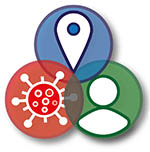
Greater Manchester Case Study
Since April 2022 the team worked to assess data needs, capabilities and gaps in our research.
The Greater Manchester Case Study project built on previous studies that were conducted during the first two years of the PROTECT National Core Study, particularly the study of Areas of Enduring Prevalence (AEPs), which examined why certain local authority areas had high, sustained levels of COVID-19 prevalence, and highlighted the impact of existing health inequalities on the wider picture of prevalence rates of COVID-19.
Previous PROTECT projects also identified limitations in data by workplace and by occupation during the course of the pandemic.
We know the pandemic created multiple and interlinked responses and changes in the workplace, and the team conducted a Greater Manchester Case Study, both to investigate workplace responses during the course of the pandemic, changes as a result of government policy including the April 2022 report ‘Living with COVID’, and to investigate how Greater Manchester workplaces were supported by public health and environmental health teams during the course of the pandemic.
In phase 3 researchers delivered a Case Study report and prepared Study 1 & 2 publications to present a layered picture of the complexities of public health and workplaces in a time of a public health emergency and the legacy it provided.
Expected Benefits
As the aim of this Case Study report was to assess the response to Living with COVID in Greater Manchester workplaces, the team have contributed to understanding what the future COVID (or other new respiratory virus) response might look like.
Project participants include those who work together to manage workplace transmission in Greater Manchester workplaces, including Greater Manchester public health and environmental health teams, and the Greater Manchester Combined Authority who together are developing Integrated Care Systems and Board in GM ICS. The dissemination of our report will aim to reach a spectrum of people and places, both within the Greater Manchester area and beyond.
Research Questions
Our overarching question ‘How will Living with COVID affect transmission risk, response and resilience in workplace settings’ remains valid and generated additional research questions about the changes in risk transmission following the Living with COVID guidance; the comparison of rates, time, place and person before and after infection; and what does the formulation of transmission risk estimates with low testing policy environment in the workplace and formulation of response actions of employers, employees and unions look like before and after Living with COVID?
Research Methods
We used multimodal – qualitative, quantitative, reflexive and interdisciplinary – methods to investigate the research question across two study work packages:
Study 1 – before and after study
- Conducted analysis of pre-1st April 2022 outbreak data by workplace to post, by workplace settings (large and SMEs)
- Frequency of outbreaks by date.
- Number and severity of outbreak.
- Conducted interviews with educational leaders.
Study 2 – mixed methods
- Conducted Qualitative interviews with the GM partnerships across the 10 GM boroughs required to work together for the local response to COVID outbreaks in the workplace to assess changes from Living with COVID.
- Conducted a survey of employers (large and SMEs) and employees to investigate changes in behaviour, response, resilience and risk perception of COVID.
Project Team
- Michael Benson, The University of Manchester
- Anne Clayson, The University of Manchester
- Bernardine Farrell, The University of Manchester
- Mark Johnson, The University of Manchester
- Sheena Johnson, The University of Manchester,
- Cath Lewis, The University of Manchester
- Claire Mann, The University of Manchester
- Janet Ubido, The University of Manchester
- Martie Van Tongeren, The University of Manchester
- Eliza Varga, The University of Manchester
- Arpana Verma, The University of Manchester
Other Partners
- Birmingham City University
- Rochdale Borough Council
- Thomas Ashton Institute for Risk and Regulatory Research
